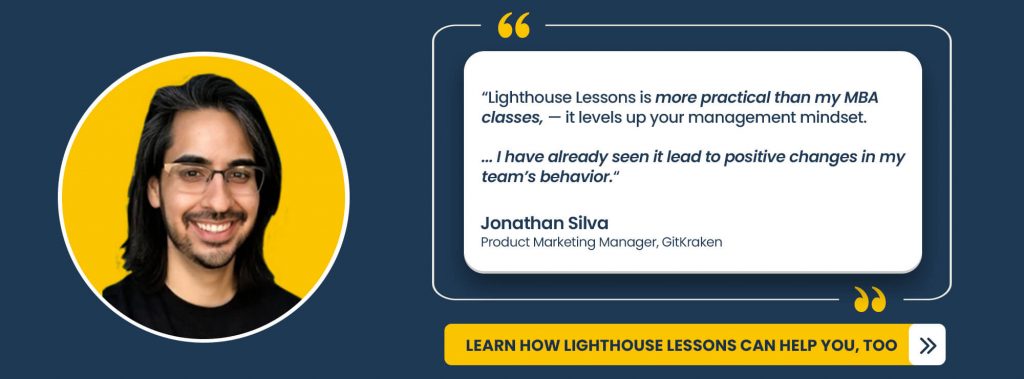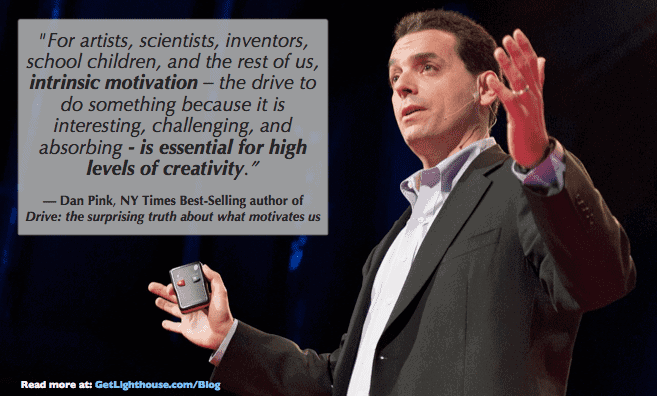"Leadership and learning are indispensable to each other." - John F. Kennedy
Becoming a manager means learning a whole new set of skills. This learning is an ongoing journey likely for the rest of your career as you face new challenges and opportunities.
There are many ways to learn new tactics and skills for managing and leading your team and the most common is reading. Whether it's great blogs or books, the written word is a powerful way to convey the lessons and insights crucial to leadership.
Often overlooked, videos and great talks can be an awesome supplement to all that reading and here today I'd like to highlight 7 excellent TED talks for managers to learn core leadership skills:
- The secret behind what makes us feel good about our work
- How you can solve the puzzle of motivation
- Key decisions to make to drive your life for the better or worse
- An incredibly powerful mindset to help you keep improving
- Ways to inspire action by leading by example
- Amazing tips for helping your team procrastinate a little less
- Why emotional intelligence is crucial to being a great leader
7 Great TED Talks for Managers
1) "What makes us feel good about our work?" by Dan Ariely
Dan Ariely is one of the best behaviorial economics researchers in the world. He has written amazing, best selling books like Predictably Irrational to help explain how humans really behave. In this TED talk, Ariely reveals key motivators for people doing their jobs (hint: It's not money!).
The first principle is having Meaning. People need a reason for the work they're doing. They also want Recognition. Without recognition for their efforts, they're much less motivated or even discouraged. Finally, the need Ownership. People feel more value in the work they feel they owned. This is how he shows that Ikea is a brilliant furniture company and those ready to make cake and brownie mixes are brilliant, too.
Further reading:
- Our Ultimate Praise Guide: How to use recognition to keep your team motivated
- How making progress makes people feel good about their work
2) "The puzzle of motivation" by Dan Pink
Understanding motivation is crucial to leading a great team, which is why I'm including another talk on the subject. In this TED talk, Dan Pink reveals that research shows that financial motivators actually hinder creativity. That means if you work in a role requiring creativity and problem solving, offering bonuses and cash rewards can hurt you and your team's performance.
So what do you do instead? Provide your team 3 things:
- Autonomy - Give people the ability to direct themselves. Don't make their work purely dictated by others, including you.
- Mastery - People want to be great by adding and improving their skills. Help them grow those skills and they'll be very motivated.
- Purpose - Tap into people's drive to work on things that matter. Give them a reason why their work is important and how they fit into the bigger picture.
They're simple concepts, but ask yourself: When was the last time you helped the people on your team feel those 3 things?
Further reading on the secrets of keeping your team motivated:
3) "Why we do what we do" by Tony Robbins
Tony Robbins is a legendary motivational speaker and coach to famous CEOs. This talk covers what really can drive you for success or failure in life.
You have key decisions to make to drive your life for the better or worse. Tony covers a ton of concepts in rapid fire and two of the best ones that are great for you as a leader are:
- What emotion will you focus on? Your outlook will impact how you handle a situation. Will you sulk or overcome? What example are you setting for your team?
- Are you growing? Are you giving? People want to feel growth and share their skills and abilities with the world. People want to be a part of and contribute to something bigger than themselves (sound familiar?).
Robbins was a little rushed, as he usually gives 50 hour seminars, but this is a great primer to many of the bigger concepts that fill his audio series and more.
Further reading:
- How to use a Positive Outlook to be a Better Leader, a way to apply what Tony Robbins explained
- Goals: How you can use them to drive your team to feel more engaged
4) "The power of believing you can improve" by Carol Dweck
Carol Dweck is a psychology professor at Stanford University. She's written an awesome book, Mindset, and this talk is a great summary of many of the concepts she covers in her book.
The key is understanding what it means to have a growth mindset. It means understanding that skills, all skills, can be learned. Don't tell someone, "wow, you're smart" or, "wow, you're a natural." Instead, you want to encourage and reward people for their hard work and the drive to learn new things that is buried inside all of us.
As a manager, this means encouraging your team to learn and improve their skills. Work to end the language of "I'm not good at that." If that's the case, work with them to learn how to get better, not avoid the weakness. A team with a growth mindset cannot be stopped, because they'll roll up their sleeves and learn how to overcome any obstacle.
Further reading:
- The 3 Key Mindsets of Great Managers, including the Growth Mindset Carol Dweck advocates for
5) "How great leaders inspire action" by Simon Sinek
Simon Sinek is an author and motivational speaker who has a simple 3 step concept that he believes drives the success of the world's greatest leaders. Those steps are:
- Why - Why do you do what you do? What is the purpose or cause for your organization?
- How - How do you do it? How do you execute on the what?
- What - What do you do you and your business do? What are your features or services?
People usually build their business from What to How and then possibly a Why. However, Sinek posits that the best leaders start with why. He says, "People don't buy what you do. They buy why you do it."
As a leader, this plays into both the business you help build and the people you recruit. Having a strong mission will help you make better product decisions as it serves as guide posts for what you will and won't do and the standards you uphold. It will also help attract and motivate great employees who want to also work on that why.
Over and over in these videos, the speakers talk about purpose, and the why is the strongest form of that purpose for a company someone works at. Have a strong why for your business and help your people understand how they play a key part in that story.
Further reading:
- How to Get Buy in at Work and get others to take action based on your example
6) Tim Urban’s: Inside the mind of a master procrastinator
Tim Urban is a hugely successful blogger known for explaining things using wry stick-figure illustrations. Even though his illustrations may seem simple, anyone who reads or listens to Urban can tell you he is an amazing storyteller. Urban also graduated from Harvard, founded a couple of companies, and even partnered with Elon Musk on his Neuralink project.
In his TED Talk on the so-called “Instant Gratification Monkey”, Urban explains how we’re all prone to losing focus and procrastinating because we want to have fun in the moment - with no regard for the past or future. Urban then goes on to give clear steps for overcoming the monkey (a metaphor for putting off things). These include:
- Becoming aware of the fact that most of what you do is a choice.
- Realizing that progress comes gradually and in small increments and not trying to do too much at once.
- Using various methods such as setting goals you’re accountable to, minimizing distractions, committing to something it’s difficult to back out of, etc.
Urban’s TED Talk is great because it combines psychology, motivation, and productivity techniques and is highly relatable for anyone (and not just for serial procrastinators).
As a manager, you’re responsible for not only your own productivity, but also that of your team. Understanding how to help everyone procrastinate a little less and get a little more done, is well worth your time, hence the placement of this video on our list.
Looking for more resources on being productive and dealing with distractions? Check out these links:
- How becoming more mindful of the present can help you deal with distractions
- The daily habits of great leaders throughout history and why overcoming stress is important for being productive
7) Brene Brown: The power of vulnerability
Brene Brown is a research professor at the University of Houston, a well known lecturer, best selling author, and podcast host. She is known for her year-long research on using shame and vulnerability as tools for improving leadership skills.
In her TED Talk, Brown advocates for a change in how we perceive our own alleged weaknesses. As she puts it:
“In our culture, we associate vulnerability with emotions we want to avoid such as fear, shame, and uncertainty. Yet we too often lose sight of the fact that vulnerability is also the birthplace of joy, belonging, creativity, authenticity, and love.”
Brown goes on to explain how we can turn the feelings we usually avoid into strengths and addresses topics such as:
- Cultivating shame resilience—the key to developing a sense of worth and belonging.
- Vulnerability as the basis for innovation, adaptability, vision, and accountability.
- Our emotional armory - how people use perfectionism, numbing, and other tactics to avoid feeling vulnerable.
- The myths of vulnerability - common misconceptions about weakness, trust, and self-sufficiency.
Brown’s TED Talk is a great resource for both you and your team as it focuses on emotional intelligence and encourages understanding yourself better.
If you want to learn more about how to become a more resilient leader and develop other key soft skills, check out these links:
- What is Emotional Intelligence in Leadership
- Resilience: How to Develop More Resilience to Thrive as a Leader
Want to build up your management skills? Lighthouse Lessons can help you.
Our bite size, highly actionable programs are perfect for even the busiest of managers. Become a better leader like Jonathan Silva did by learning more and signing up here.





